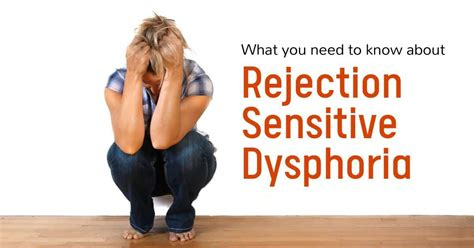Rejection Sensitivity Disorder as it Relates to Adult ADHD
By PopopThePatriot (informational only)
Rejection sensitivity dysphoria (RSD) is a condition characterized by an extreme fear of rejection or criticism. This disorder can manifest in a variety of ways, including social anxiety, hypersensitivity to criticism, and difficulty handling rejection. In adults with severe ADHD, rejection sensitivity disorder can exacerbate existing symptoms and make it difficult to maintain healthy relationships and work environments. This paper will explore the relationship between rejection sensitivity disorder and severe ADHD in adults.
The Link Between RSD and ADHD:
ADHD is a neurodevelopmental disorder that affects attention, impulsivity, and hyperactivity. Many individuals with ADHD struggle with social skills, including reading social cues and regulating emotional responses. This can make them more susceptible to developing rejection sensitivity disorder, as they may be hypersensitive to perceived criticism or rejection. Additionally, individuals with ADHD may have difficulty with emotional regulation, which can amplify the intensity of their emotional response to perceived rejection.
Symptoms of RSD in Adults with Severe ADHD:
In adults with severe ADHD, rejection sensitivity disorder can manifest in a variety of ways. They may be hypersensitive to criticism and feel intense emotional pain when they perceive rejection, even if the rejection is minor or unintentional. This can lead to social withdrawal, avoidance of new relationships, and difficulty maintaining healthy relationships. Individuals with RSD may also experience physical symptoms such as rapid heart rate, sweating, and nausea in response to perceived rejection.
Impact on Work and Relationships:
Rejection sensitivity disorder can have a significant impact on work and relationships for adults with severe ADHD. In the workplace, individuals with RSD may avoid taking on new projects or seeking promotions for fear of rejection. They may also have difficulty receiving constructive feedback, which can inhibit their professional growth. In relationships, RSD can cause misunderstandings and conflicts, as individuals with the disorder may overreact to perceived slights or criticism from their partners.
Treatment:
Treatment for rejection sensitivity disorder in adults with severe ADHD typically involves a combination of medication and therapy. Medications such as antidepressants or mood stabilizers can help regulate emotions and reduce hypersensitivity to perceived rejection. Cognitive-behavioral therapy (CBT) can also be helpful, as it teaches individuals how to reframe negative thoughts and emotions related to rejection. Additionally, social skills training and communication coaching can help individuals with RSD learn how to communicate effectively and manage their emotions in social situations.
Conclusion:
Rejection sensitivity disorder can be a challenging condition for adults with severe ADHD, impacting their work and relationships. However, with proper treatment, individuals with RSD can learn to manage their symptoms and lead fulfilling lives. It is essential to recognize the link between ADHD and RSD to provide appropriate support and treatment to individuals who may be struggling with both conditions.





